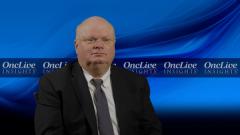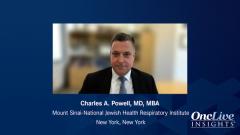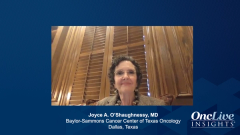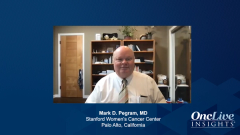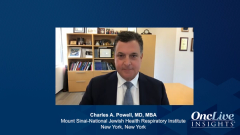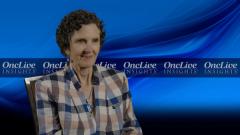
Managing Breast Cancer: Who’s Involved in Multidisciplinary Care?
Experts reflect on the importance of multidisciplinary care and outline the many disciplines involved in diagnosing and treating breast cancer.
Episodes in this series

Charles A. Powell, MD, MBA: A true foundation of care for patients in the ambulatory setting involves patient-centered care, and that’s often multidisciplinary. That is the fundamental tenet that lies behind the structure of our respiratory institute, and it’s crucial for cancer care across different cancer types. For patients to have the most appropriate diagnosis, staging, and treatment for their cancers, it often requires cooperation between multiple physicians of multiple specialties—oncologists, pulmonologists, infectious disease specialists, internists, and surgeons. When all these specialties work together, the patients get the best patient-centered care that’s appropriate for their disease.
Joyce A. O’Shaughnessy, MD: The number of disciplines that help patients with breast cancer is a long list of people, from that initial diagnosis through treatment of early-stage disease and unfortunately sometimes into treatment of metastatic disease. There are a vast number of disciplines involved. From a broader view, we start with the radiologist, who is critically important. Oftentimes, we have to back up and say that primary care physician would be the 1 who reminds them and puts the order in for breast imaging. We do mammogram, the MRI, and an ultrasound. So we have the primary care physician involved as well as the radiologist.
The pathologist is also critically important. If cancer is diagnosed, then we have the nurse navigator who often helps, and then the breast surgeon. Oftentimes, there’s a breast nurse practitioner physician assistant as well, but there’s a lot of education for the patient. Then there’s the plastic reconstruction surgeon, who’s also involved. The radiation oncologist gets involved early on, as does the medical oncologist. The genetic experts are also critical. Sometimes, there’s an outside pathologist. You have to go to expert pathology groups outside your own institution if there are equivocal results. Then we have our expert oncology nurses and our oncology pharmacist, who are critically important too, helping us access medications, making sure doses and schedules are correct—drug-drug interactions, administration of therapy, and so forth. Sometimes, we have to get a reproductive endocrinologist involved because of fertility issues in young women, who need to do egg harvesting and embryo preservation.
We then will go on during treatment. That depends on what toxicity has come up, so we often have to mobilize several of our collaborators and colleagues—a dermatologist, a hepatology specialist, a pulmonologist. We also get our colleagues who are experts in scalp cooling. Our experts in reimbursement are critical as well for a lot of these therapies, including scalp cooling. Women usually in the curative saying will have surgery radiation therapy. We have our rehabilitation experts. We have our physical therapists, who are expert in preventing and managing lymphedema, rehabbing shoulders, and rehabbing people after therapy. We have nutritionists and dietitians. We have physicians who are expert in bariatric medicine—I think obesity medicine is the new name as a board certification. That’s very important as well.
We have to involve endocrinologist frequently because of diabetes. That’s quite common during treatment and after treatment. We have to involve a gynecologist because women sometimes have to have oophorectomy. It’s not uncommon for women to have oophorectomy. Unfortunately, some patients go on to develop metastatic disease. So we involve our interventional radiologist to get access to metastatic lesions and get enough tissue to be able to evaluate the standard biomarkers. But also, now we’re collaborating with experts in molecular medicine—a molecular pathologist, who’s doing a deep dive into the genome to find what mutations exists, such as PIK3CA, and also looking for PD-L1 state.
If it’s triple-negative disease, we involve our geneticists if they haven’t already been involved to look for germline BRCA1 or BRCA2. We have an expert pathology review of the tissue. The medical oncologist is very involved at that time, but it depends on what has come up. If patients suffer from arthralgias and myalgias, we may involve a rheumatologist or an immunologist. We need a pulmonologist, our GI [gastrointestinal] doctors, our hepatologist, our infectious disease specialist, and our hematologist too. Sometimes patients will have a pancytopenia, and we need our hematologist involved. It really depends on which toxicity has come up as well.
We need our palliative care specialist because of the management of variety of adverse effects is sometimes more difficult than a medical oncologist can provide. We have our own nurse practitioners and physician assistants who do a lot of education. We have specialized nurse practitioners who discuss end-of-life choices that patients may have during education. In that regard, our oncology nurses are invaluable—our oncology infusion nurses, our pharmacist. This is because metastatic disease involves a lot of complex medications for drug-drug interactions. We eventually involve our hospice colleagues toward the end of life as well.
That’s a broad overview. There are a lot of practitioners who we call upon. What I didn’t mention was involving psychiatry and psychology, which is a lot of counseling and social work. This is very important with various aspects—economic, socioeconomic, family dynamics, and so forth—for patients going through breast cancer. Also, we have expert financial counselors to counsel the patients. But we also have experts at accessing treatments for patients. That’s a real expertise these days, regarding patient-access programs for therapies but also foundation around the country, that can help people with co-pay assistance. There’s a lot of expertise that’s necessary to optimize patient care.
Transcript Edited for Clarity


